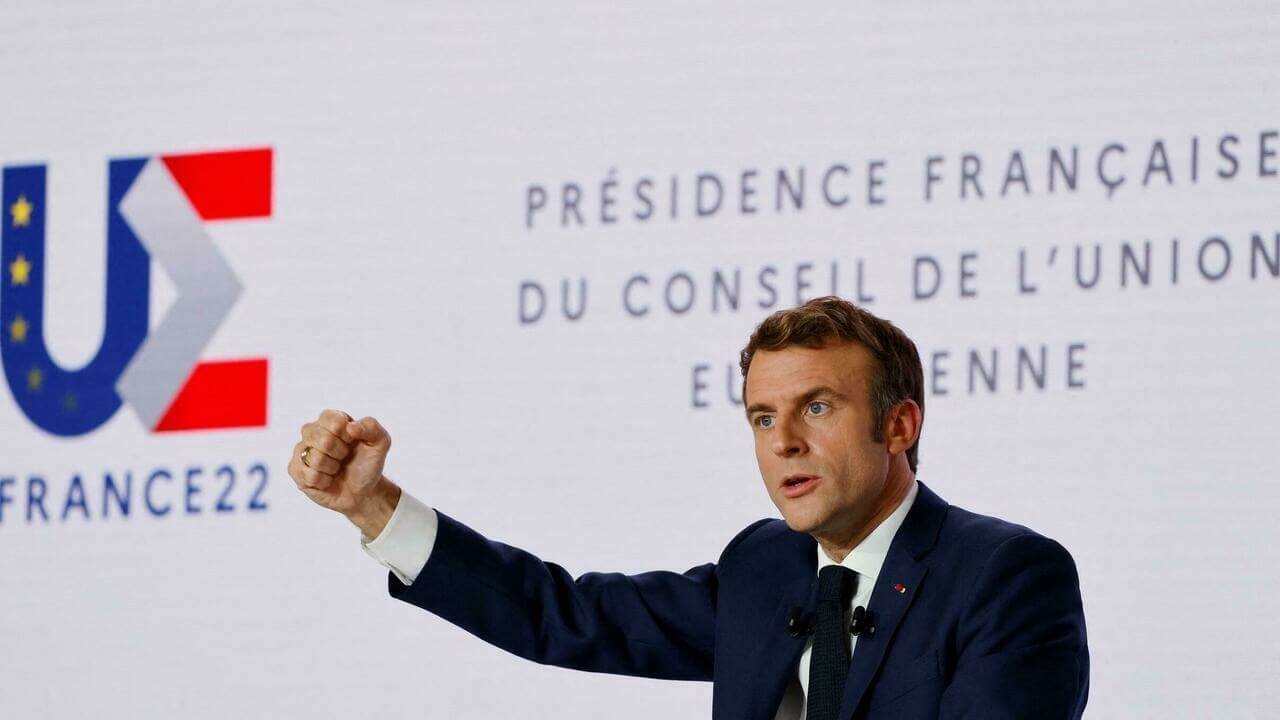French President Emmanuel Macron took a shot at illegal migration and pushed for strong external borders in the European Union (EU) to restrict people from entering the bloc’s passport-free area unlawfully.
While speaking to the La Voix du Nord newspaper, Macron said, “Our passport-free area [in Europe] is being threatened if we don’t know how to guard our external borders and monitor who is entering in.”
Macron met the bloc’s interior ministers in Northern France on Wednesday evening as Paris currently holds the bloc’s rotating presidency for six months. Additionally, Macron said migration policies need to be discussed with relevant authorities, who will anticipate and present plans to prevent a migration crisis.
While delivering a speech in the city of Tourcoing on the Belgian border, Macron said, “We want to establish a real Schengen Council to supervise the [passport-free] Schengen area, like what we have for the Eurozone.” He suggested that the first meeting of the council could be held next month.
The Schengen area includes 26 nations, including non-EU countries like Iceland, Liechtenstein, Norway and Switzerland. Macron also hopes to constitute a “rapid reaction force” to protect state borders of the EU member states in case of a migrant surge.
Furthermore, Macron pushed for changes in the bloc’s asylum application process. Reportedly, the EU's national leaders have agreed that the bloc’s immigration policies need revision, but disagree on how to go about it.
He also said that the bloc should be more efficient in deporting refugees whose asylum applications have been rejected. In this regard, Macron also put forth the idea of reducing the number of visas issued to non-EU nations, who are often reluctant to take back their citizens whose asylum has been rejected. He also said the issue would be discussed at the upcoming summit between the EU and the African Union later this month.
The arrival of over one million people, the majority of them fleeing war in Syria, in 2015 sparked the Union’s biggest political crisis. Thousands landed on the shores of Greece from Turkey that overwhelmed the former’s political system. Despite this, other EU member states refused to share the burden of caring for the refugees.
Immigration : "Nous n'avons pas dans chaque pays d'Europe les mêmes conditions d'octroi de l'asile", souligne @jnbarrot.#CVR pic.twitter.com/dpoHnmGlV9
— LCP (@LCP) February 2, 2022
French Minister of the Interior Gerald Darmanin urged all member states to extend support to nations where migrants first arrive, including the Mediterranean or eastern European countries. “The idea is to understand the difficulties of countries of first entry in the EU and show full solidarity via relocating asylum seekers in other countries or helping them financially. In exchange, they must record all foreigners who arrive on our soil,” he said.
Macron, who is expected to seek a second term as the French President, has focused on illegal migration to lay off criticism from opponents. Conservative and far-right candidates have condemned Macron for his government’s inaction on stemming migration, especially after 27 migrants died in the English Channel during November last year. The presidential candidates from these parties have declared migration to be a priority for the presidential campaigns.
Far-right presidential candidate Eric Zemmour visited the northern town of Calais in January, where migrants had gathered as they attempted to enter Britain. “Migrants are dying at sea because we’re not tough enough with them. If we had told them [...] you won’t come to France, you will be deported as soon as you arrive, they would not be dead,” he said.
The other far-right presidential candidate Marine Le Pen travelled to a border area between France and Spain, which is used as an entry route for migrants crossing from Africa, and called for re-establishing border controls. Likewise, Conservative contender Valerie Pécresse also recently visited a camp for asylum-seekers and stressed the need for strong EU borders.
So far, the migration talks have largely focussed on outsourcing the EU’s migrant challenges to countries of departure or transit and shoring up the borders.

